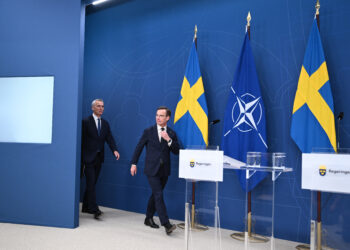Brussels – The open obstructionism of the Hungarian premier, Viktor Orbán, to the ratification of Sweden’s NATO accession protocol lasted less than 24 hours after the stalemate breakthrough with the favourable vote of the Turkish Grand National Assembly came yesterday evening (Jan. 23). Remaining the only member country of the North Atlantic Treaty Organization that has not formally approved Stockholm’s entry as the 32nd member of the Atlantic Alliance, Hungary has come under pressure from other NATO allies—including Secretary General Jens Stoltenberg—and as early as today (Jan. 24), Prime Minister Orbán has announced that the vote of the National Assembly in Budapest to ratify Stockholm’s accession protocol will come “at the earliest possible opportunity”.

From left: NATO Secretary General Jens Stoltenberg and Sweden’s Prime Minister Ulf Kristersson (credits: Jonathan Nackstrand/Afp)
“I reiterated that the Hungarian government supports Sweden’s membership in NATO, I also stressed that we will continue to urge the Hungarian National Assembly to vote in favour of Sweden’s accession,” the Hungarian leader wrote on X following the phone call with the NATO secretary general. Stoltenberg himself “welcomed the clear support” of Orbán and the Hungarian government’s
calling for the ratification of Sweden’s accession protocol “as soon as the Parliament returns to session.” The end of Orbán’s vague attempts to hold the new member’s entry into the alliance hostage came with the Stockholm government’s blunt refusal to attend a meeting in Budapest to “negotiate Sweden’s membership in NATO,” as the invitation delivered yesterday recited by Prime Minister Orbán to his Swedish counterpart, Ulf Kristersson.
While in the past year and a half, the focus was all on Ankara and President Recep Tayyip Erdoǧan‘s explicit threats of blocking the process in case of non-compliance with the required conditions, in Budapest the dossier of the ratification of Sweden’s NATO accession protocol never advanced mainly due to the diplomatic clash between the two EU member states. Precisely during Sweden’s six-month presidency of the EU Council (between January and July 2023), Premier Kristersson was particularly harsh in his criticism of the erosion of the rule of law determined by the Orbán government and still is one of the most uncompromising leaders on the Hungarian premier’s blackmail at the European Council table (particularly on the issues of EU funds and support for Ukraine).
Sweden’s steps to join NATO
To become a member of NATO, a country must send a formal application, previously approved by its national parliament. This opens two stages of discussions with the Alliance, which do not necessarily pave the way for membership: the first, the Intensified Dialogue, delves into the country’s rationale for applying; the second, the Membership Action Plan, prepares the potential candidate to meet the necessary political, economic, military and legal requirements (democratic system, market economy, respect for the rule of law and fundamental rights, standards of intelligence and contribution to military operations, aptitude for peaceful conflict resolution). This second round of discussions was introduced in 1999 after the accession of Poland, Hungary, and the Czech Republic, to address the process with would-be members with political systems other than those of the Alliance’s founding countries, such as the former Soviet countries.
 The accession procedure formally begins with the application of Article 10 of the North Atlantic Treaty, which provides that “the parties may, by unanimous agreement, invite for accession any other European state capable of furthering the development of the principles of this Treaty and contributing to the security of the North Atlantic region.” The resolution must be voted on unanimously by all member countries. At this point the accession talks open at headquarters in Brussels to confirm the candidate’s willingness and ability to meet the obligations of membership: political and military issues first, and security and economic issues later. After the accession talks, which are in effect a phase of negotiations, the candidate country’s foreign minister sends a letter of intent to the Alliance secretary general.
The accession procedure formally begins with the application of Article 10 of the North Atlantic Treaty, which provides that “the parties may, by unanimous agreement, invite for accession any other European state capable of furthering the development of the principles of this Treaty and contributing to the security of the North Atlantic region.” The resolution must be voted on unanimously by all member countries. At this point the accession talks open at headquarters in Brussels to confirm the candidate’s willingness and ability to meet the obligations of membership: political and military issues first, and security and economic issues later. After the accession talks, which are in effect a phase of negotiations, the candidate country’s foreign minister sends a letter of intent to the Alliance secretary general.
The accession process ends with the Protocol of Accession, which is prepared by an amendment to the Washington Treaty, the founding text of the Alliance. This Protocol must be ratified by all members, with procedures varying by country: in Italy, the vote of the Parliament in a joint session is required, to authorize the President of the Republic to ratify the international treaty. Once the Accession Protocol has been amended, the NATO Secretary General formally invites the candidate country to join the Alliance, and the agreement is deposited at the U.S. State Department headquarters in Washington. At the end of this process, the candidate is officially a member of the North Atlantic Treaty Organization.
English version by the Translation Service of Withub






